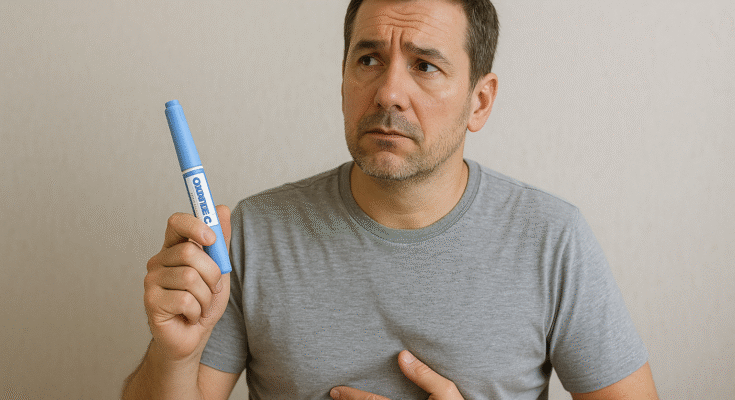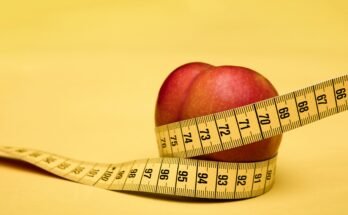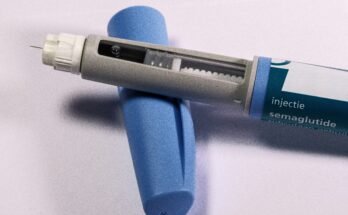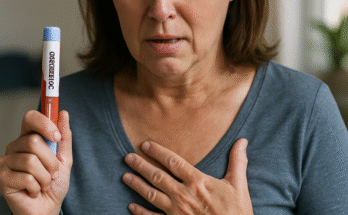If you’ve had your gallbladder removed and are considering Ozempic for managing type 2 diabetes or weight loss, you’re probably wondering if it’s safe and effective. Gallbladder removal, known as a cholecystectomy, is a common procedure, but it can change how your body handles digestion. So, can you take Ozempic after gallbladder removal? Let’s dive into the details!
Is It Safe to Take Ozempic After Gallbladder Removal?
That said, there’s a catch. Without a gallbladder, your bile flow is less controlled, which can lead to digestive issues like diarrhea, bloating, or nausea—symptoms that overlap with Ozempic’s common side effects. Some people report that these side effects, like gastrointestinal discomfort, feel more intense post-cholecystectomy because bile is released more rapidly into the intestines. If you experience these, don’t panic, but do check in with your doctor to tweak your treatment plan.
What to Expect When Taking Ozempic Post-Cholecystectomy
Since Ozempic slows gastric emptying, it can amplify digestive changes after gallbladder removal. For example, you might notice:
- Nausea or vomiting: These are common with Ozempic and may feel more pronounced without a gallbladder.
- Diarrhea or gas: Both gallbladder removal and Ozempic can cause looser stools, so you might need to monitor this closely.
- Bloating or abdominal pain: The altered bile flow can make fatty foods harder to digest, and Ozempic’s effect on digestion might add to this.
There’s limited long-term data on using semaglutide after gallbladder removal, as it’s a relatively new medication. However, a study in Diabetes, Obesity, and Metabolism found that people with diabetes who had their gallbladders removed responded well to GLP-1 receptor agonists like Ozempic, with no major gastrointestinal side effects beyond what’s typical. Still, everyone’s body is different, so regular monitoring of blood glucose levels and digestive health is key.
Potential Risks and Considerations
While Ozempic is generally safe post-cholecystectomy, there are a few things to watch out for:
- Bile duct complications: Without a gallbladder, there’s a small risk of bile duct issues, like stones forming in the ducts. Ozempic’s link to gallbladder disease (like gallstones) in some users raises questions about whether it could increase this risk, though no definitive data confirms this.
- Weight loss effects: Ozempic’s weight loss benefits are a big draw, but rapid weight loss can sometimes lead to gallstone formation in those who still have their gallbladder. Post-removal, this isn’t a concern, but you’ll still need to manage your diet to avoid digestive discomfort.
- Surgery precautions: If you’re planning surgery, your doctor might ask you to pause Ozempic a week before due to the risk of pulmonary aspiration under anesthesia, caused by slowed digestion.
Always consult your healthcare provider before starting or resuming Ozempic. They may recommend adjusting your dose or monitoring your blood sugar control more closely, especially in the early stages.
Lifestyle Tips for Success
To make Ozempic work smoothly after gallbladder removal, consider these tips:
- Eat a balanced diet: Focus on low-fat, high-fiber foods to ease digestion. Avoid heavy, greasy meals that can trigger diarrhea or bloating.
- Stay hydrated: Proper hydration supports digestive health and helps your body adjust to changes in bile flow.
- Monitor symptoms: Keep a log of any gastrointestinal side effects and share them with your doctor. This can help fine-tune your dosage or identify other issues early.
- Exercise regularly: Physical activity supports weight management and metabolic health, complementing Ozempic’s effects.
FAQs About Ozempic and Gallbladder Removal
1. Is Ozempic Safe If You Have No Gallbladder?
Yes, Ozempic is generally safe after gallbladder removal. It doesn’t rely on the gallbladder for absorption or effectiveness. However, some people experience stronger side effects like nausea or diarrhea due to changes in bile flow. Consult your doctor to ensure it’s right for you and to manage any digestive issues.
2. Can You Take Weight Loss Shots Without a Gallbladder?
Yes, weight loss shots like Ozempic or other GLP-1 receptor agonists (e.g., Wegovy, Saxenda) can be taken after gallbladder removal. The absence of a gallbladder doesn’t affect their ability to reduce appetite or promote weight loss. However, you may need to adjust your diet to minimize gastrointestinal discomfort, especially with fatty foods.
3. Is It Harder to Lose Weight After Gallbladder Removal?
Losing weight after gallbladder removal can be challenging for some due to digestive changes. Without a gallbladder, your body may struggle to process high-fat foods, leading to weight gain in some cases. However, Ozempic’s appetite-suppressing and gastric emptying effects can still support weight loss. Pairing it with a healthy diet and exercise is crucial for success.
Final Thoughts
Taking Ozempic after gallbladder removal is generally safe and effective for managing type 2 diabetes or supporting weight loss, but it comes with some considerations. The overlap between Ozempic’s side effects and post-cholecystectomy digestive issues means you’ll need to stay in close touch with your healthcare provider to monitor symptoms and adjust your dosage if needed. By pairing Ozempic with a healthy lifestyle—think balanced diet, regular exercise, and hydration—you can maximize its benefits while minimizing discomfort.
If you’re still unsure, have an open chat with your doctor about your medical history and goals. They can guide you on whether Ozempic or another GLP-1 receptor agonist is the best fit for your metabolic health post-gallbladder removal. Got more questions? Drop them below, and let’s keep the conversation going!

James Rowen is a certified medical writer and healthcare researcher specializing in endocrinology and metabolic health. With over a decade of experience analyzing weight management therapies, James has developed deep expertise in GLP-1 receptor agonists, including Ozempic.




